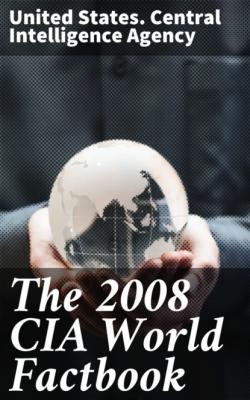The 2008 CIA World Factbook. United States. Central Intelligence Agency
Чтение книги онлайн.
Читать онлайн книгу The 2008 CIA World Factbook - United States. Central Intelligence Agency страница 71

Nationality:
noun: Aruban(s) adjective: Aruban; Dutch
Ethnic groups:
mixed white/Caribbean Amerindian 80%, other 20%
Religions:
Roman Catholic 80.8%, Protestant 9%, other (includes Hindu, Muslim,
Confucian, Jewish) 5.6%, none or unspecified 4.6%
Languages:
Papiamento (a Spanish-Portuguese-Dutch-English dialect) 66.3%, Spanish 12.6%, English (widely spoken) 7.7%, Dutch (official) 5.8%, other 2.2%, unspecified or unknown 5.3% (2000 census)
Literacy:
definition: NA total population: 97.3% male: 97.5% female: 97.1% (2000 census)
School life expectancy (primary to tertiary education):
total: 14 years male: 13 years female: 14 years (2006)
Education expenditures:
4.8% of GDP (2005)
Government
Aruba
Country name:
conventional long form: none conventional short form: Aruba
Dependency status:
member country of the Kingdom of the Netherlands; full autonomy in internal affairs obtained in 1986 upon separation from the Netherlands Antilles; Dutch Government responsible for defense and foreign affairs
Government type:
parliamentary democracy
Capital:
name: Oranjestad geographic coordinates: 12 31 N, 70 02 W time difference: UTC-4 (1 hour ahead of Washington, DC during Standard Time)
Administrative divisions:
none (part of the Kingdom of the Netherlands)
Independence:
none (part of the Kingdom of the Netherlands)
National holiday:
Flag Day, 18 March (1976)
Constitution:
1 January 1986
Legal system:
based on Dutch civil law system, with some English common law influence
Suffrage:
18 years of age; universal
Executive branch:
chief of state: Queen BEATRIX of the Netherlands (since 30 April 1980); represented by Governor General Fredis REFUNJOL (since 11 May 2004) head of government: Prime Minister Nelson O. ODUBER (since 30 October 2001) cabinet: Council of Ministers elected by the Staten elections: the monarch is hereditary; governor general appointed for a six-year term by the monarch; prime minister and deputy prime minister elected by the Staten for four-year terms; election last held in 2005 (next to be held by 2009) election results: Nelson O. ODUBER elected prime minister; percent of legislative vote - NA
Legislative branch:
unicameral Legislature or Staten (21 seats; members elected by direct popular vote to serve four-year terms) elections: last held 23 September 2005 (next to be held in 2009) election results: percent of vote by party - MEP 43%, AVP 32%, MPA 7%, RED 7%, PDR 6%, OLA 4%, PPA 2%; seats by party - MEP 11, AVP 8, MPA 1, RED 1
Judicial branch:
Common Court of Justice of Aruba (judges are appointed by the monarch)
Political parties and leaders:
Aliansa/Aruban Social Movement or MSA [Robert WEVER]; Aruban Liberal Organization or OLA [Glenbert CROES]; Aruban Patriotic Movement or MPA [Monica ARENDS-KOCK]; Aruban Patriotic Party or PPA [Benny NISBET]; Aruban People's Party or AVP [Mike EMAN]; People's Electoral Movement Party or MEP [Nelson O. ODUBER]; Real Democracy or PDR [Andin BIKKER]; RED [Rudy LAMPE]; Workers Political Platform or PTT [Gregorio WOLFF]
Political pressure groups and leaders:
other: environmental groups
International organization participation:
Caricom (observer), ILO, IMF, Interpol, IOC, ITUC, UNESCO (associate), UNWTO (associate), UPU, WCL, WFTU, WMO
Diplomatic representation in the US:
none (represented by the Kingdom of the Netherlands); note - Mr. Henry BAARH, Minister Plenipotentiary for Aruba at the Embassy of the Kingdom of the Netherlands
Diplomatic representation from the US:
the US does not have an embassy in Aruba; the Consul General to Netherlands Antilles is accredited to Aruba
Flag description:
blue, with two narrow, horizontal, yellow stripes across the lower portion and a red, four-pointed star outlined in white in the upper hoist-side corner
Economy
Aruba
Economy - overview:
Tourism is the mainstay of the small, open Aruban economy, with offshore banking and oil refining and storage also important. The rapid growth of the tourism sector over the last decade has resulted in a substantial expansion of other activities. Over 1.5 million tourists per year visit Aruba, with 75% of those from the US. Construction continues to boom, with hotel capacity five times the 1985 level. In addition, the country's oil refinery reopened in 1993, providing a major source of employment, foreign exchange earnings, and growth. Tourist arrivals have rebounded strongly following a dip after the 11 September 2001 attacks. The island experiences only a brief low season, and hotel occupancy in 2004 averaged 80%, compared to 68% throughout the rest of the Caribbean. The government has made cutting the budget and trade deficits a high priority.
GDP (purchasing power parity):
$2.258 billion (2005 est.)
GDP (official exchange rate):
$2.258 billion (2005 est.)
GDP - real growth rate:
2.4% (2005 est.)
GDP - per capita (PPP):
$21,800 (2004 est.)
GDP - composition by sector:
agriculture: 0.4% industry: 33.3% services: 66.3% (2002 est.)